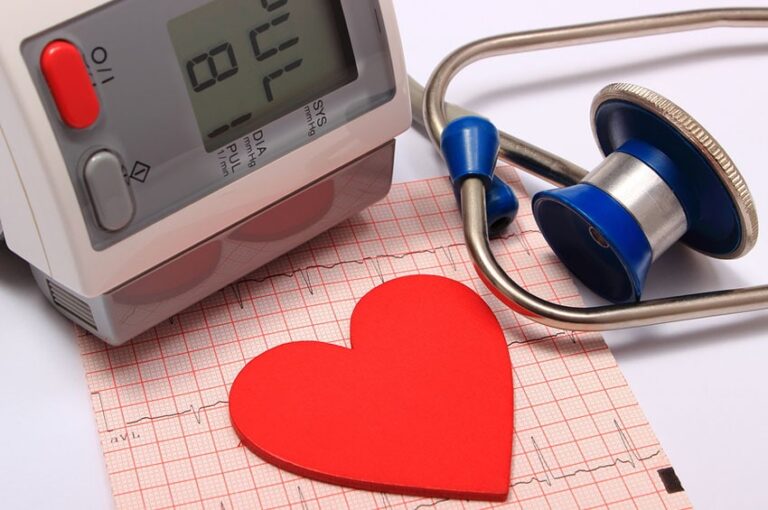High blood pressure, also known as hypertension, is one of the most common yet dangerous conditions affecting heart health. Often called a “silent killer,” high blood pressure may not show obvious symptoms but can lead to severe complications like heart disease, stroke, and heart failure if left unmanaged.
In this guide, we’ll explore the connection between high blood pressure and heart health, its causes, symptoms, diagnosis, and how to prevent and manage it effectively.
What is High Blood Pressure?
Understanding Blood Pressure Readings
Blood pressure is the force of blood pushing against the walls of your arteries. It’s measured in millimeters of mercury (mm Hg) and has two numbers:
- Systolic (upper number): Pressure when the heart beats
- Diastolic (lower number): Pressure when the heart rests between beats
Normal blood pressure: Less than 120/80 mm Hg
Hypertension: 130/80 mm Hg or higher
How High Blood Pressure Affects the Heart
The Impact on Cardiovascular Health
High blood pressure forces the heart to work harder to pump blood. Over time, this extra effort can:
- Thicken the heart muscle, especially the left ventricle
- Damage blood vessels
- Accelerate plaque buildup in arteries (atherosclerosis)
- Increase the risk of heart attacks and strokes
Complications of Long-Term Hypertension
- Coronary artery disease
- Enlarged heart (left ventricular hypertrophy)
- Heart failure
- Irregular heart rhythms (arrhythmias)
Causes and Risk Factors
Common Causes
- Poor diet (high in sodium and processed foods)
- Lack of physical activity
- Obesity
- Smoking
- Excessive alcohol intake
- Stress
- Genetic predisposition
Risk Groups
- Older adults (especially over age 60)
- People with family history of hypertension
- Individuals with diabetes or kidney disease
Signs and Symptoms of High Blood Pressure
Why It’s Called the “Silent Killer”
Most people with high blood pressure have no symptoms, which is why regular screening is essential.
When symptoms occur, they may include:
- Headaches
- Dizziness
- Blurred vision
- Chest pain
- Shortness of breath
- Nosebleeds (in severe cases)
How High Blood Pressure is Diagnosed
Blood Pressure Monitoring
- Manual and digital BP monitors in clinics or at home
- Ambulatory blood pressure monitoring (ABPM): 24-hour tracking
- Multiple readings over time confirm the diagnosis
Diagnostic Tests to Assess Heart Impact
- ECG (Electrocardiogram)
- Echocardiogram
- Blood tests for cholesterol and kidney function
Treatment Options for High Blood Pressure
Lifestyle Modifications
- Reduce salt intake (no more than 2,300 mg/day)
- Exercise regularly (30 minutes/day)
- Eat heart-healthy foods (DASH diet: rich in fruits, veggies, whole grains)
- Quit smoking and limit alcohol
- Maintain healthy weight
Medications
| Drug Type | How It Helps |
|---|---|
| Diuretics | Removes excess sodium and water |
| ACE inhibitors | Relaxes blood vessels |
| Beta-blockers | Slows heart rate and reduces output |
| Calcium channel blockers | Helps blood vessels relax |
| ARBs (Angiotensin II receptor blockers) | Lowers pressure |
Always follow your doctor’s guidance for medications.
Managing High Blood Pressure Day-to-Day
Tips for Consistent Control
- Take medications as prescribed
- Monitor your blood pressure regularly
- Stick to a consistent routine
- Manage stress through yoga, meditation, or therapy
- Avoid caffeine and NSAIDs in excess
Preventing High Blood Pressure and Heart Disease
Proactive Steps
- Eat more fiber-rich and potassium-rich foods like bananas and spinach
- Stay physically active and avoid a sedentary lifestyle
- Schedule regular check-ups to monitor changes
- Educate yourself and your family about cardiovascular health
- Address sleep disorders such as sleep apnea
Table: Blood Pressure Categories
| Category | Systolic (mm Hg) | Diastolic (mm Hg) |
|---|---|---|
| Normal | Less than 120 | Less than 80 |
| Elevated | 120–129 | Less than 80 |
| High BP (Stage 1) | 130–139 | 80–89 |
| High BP (Stage 2) | 140+ | 90+ |
| Hypertensive Crisis | 180+ | 120+ |
Conclusion
High blood pressure is both preventable and manageable, but only if you take it seriously. Left uncontrolled, it can damage your heart, arteries, kidneys, and more. Early detection, lifestyle changes, and medical treatment play a crucial role in reducing risks and ensuring a healthier, longer life. Your heart deserves daily care — don’t wait until it’s too late.
FAQs
1. Can high blood pressure go away on its own?
No, high blood pressure doesn’t go away without intervention. It requires lifestyle changes and sometimes medication.
2. Is high blood pressure always dangerous?
Yes. Even if there are no symptoms, high BP increases your risk for serious heart problems.
3. How often should I check my blood pressure?
At least once a year if it’s normal, more often if you have elevated or high BP or other health issues.
4. Can stress cause high blood pressure?
Yes, chronic stress can contribute to hypertension by increasing adrenaline and cortisol levels.
5. Are home BP monitors accurate?
Yes, especially if used properly. Choose one approved by health authorities and check readings with your doctor.
6. What foods help lower blood pressure?
Leafy greens, berries, bananas, oats, garlic, and low-fat yogurt are great for reducing BP naturally.
7. Can children or teenagers have high blood pressure?
Yes. Childhood obesity, poor diet, and genetic factors can lead to high BP in youth.
8. What is the best exercise for lowering BP?
Aerobic activities like walking, swimming, cycling, and dancing help lower blood pressure effectively.









